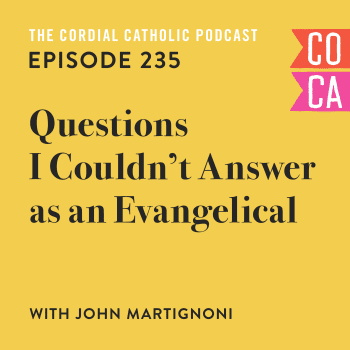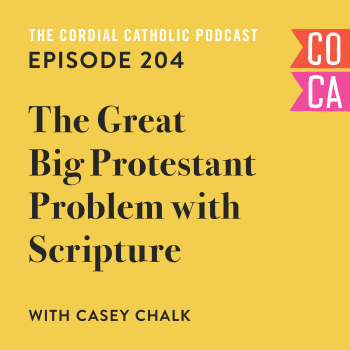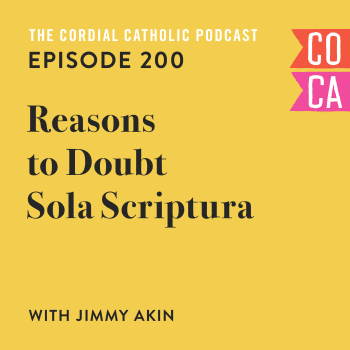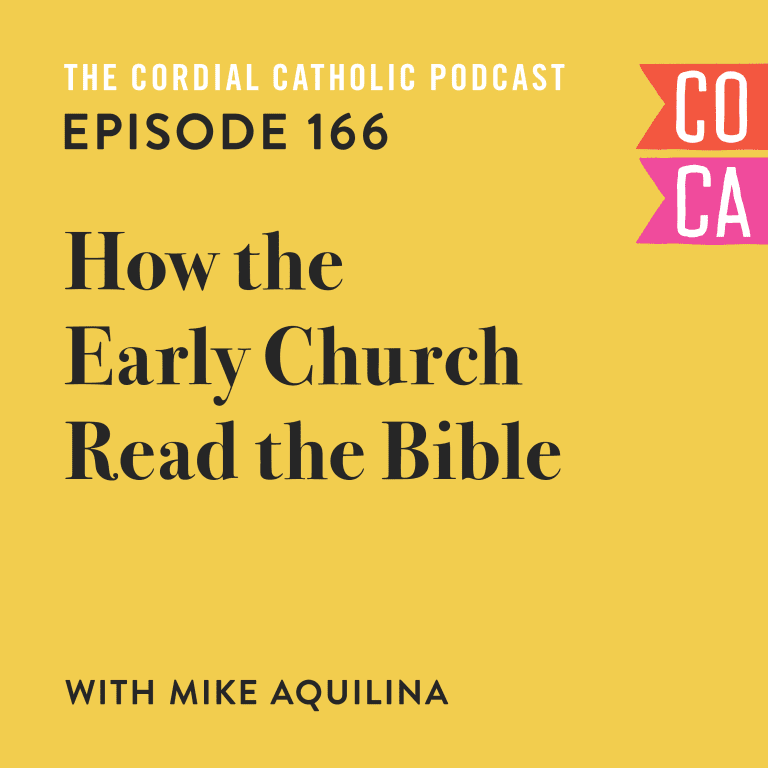
As an Evangelical Protestant, I didn’t think about the disparate state of the Christian Church very much. It wasn’t on my radar. I was, for a while, a nominal Pentecostal. Then I found a charismatic Pentecostal community. Then, a bit later on, I joined an quasi-Baptist church (which was shortly thereafter ejected from the denomination, or departed).
I ended my career as an Evangelical in a phenomenal non-denominational church.
Then I became Catholic.
And, while I didn’t think much about the plethora of Protestant denominations early on in my faith journey, when I began to consider questions about the Bible, tradition, and authority I began to take another look at the landscape of the Christian Church.
The Bible is the Standard of Truth
As an Evangelical, I held the Bible to be my highest authority of Truth.
The Bible was it.
We believed and followed what the Bible taught. We lived according to that standard.
And it seemed to make sense. After all, the Bible was the record of the very words of Christ and His apostles, His prophets and forerunners in the Old Testament, and His revelation of the end of the world, as recorded by the Apostle John.
It was the Word of God, and we treated it as such.
But in setting up the Word of God as the standard by which we must live we Protestants created an enormous problem: Who interprets the Bible?
My Spiritual Lineage
As a nominal Pentecostal we believed in the parts of the New Testament that refer to what we called the gifts of the Spirit we just didn’t believe they were that big of a deal. Occasionally, on a Sunday morning, one of the older ladies in the congregation would get up and begin feverishly speaking in tongues but she was, most often, quietly subdued by one of the elders in the church.
As a charismatic Pentecostal, speaking in tongues was a regular occurrence on a Sunday morning, Sunday night, or Wednesday at the mid-week prayer service. It wasn’t subdued, it was encouraged. And those who hadn’t yet spoken in tongues—those who hadn’t received the gift—hadn’t yet been “baptized by fire,” and weren’t to be considered truly Christian. Not just yet anyway.
As a quasi-Baptist, our church was seeker-friendly and emphasized the forgiving message of Jesus. Sunday mornings were intentionally accessible and friendly. When the leadership team decided, based on their interpretation of Scripture, to begin to elect women to the board of elders tensions with the larger denomination grew and, if I recall right, the church eventually left the denominational fold which originally commissioned them.
Finally, as a non-denominational Christian, I was part of a loving and welcoming church which emphasized the importance of tradition alongside social justice causes and building genuine community. As a leadership team, the church chose to emphasize very little in the way of doctrine and lets most members of the congregation decide for themselves. As a result, beliefs on issues of same-sex marriage, abortion, the nature of Scripture, and prayer, are held in a diversity of opinions amongst the congregation.
This is my spiritual lineage.
Interpretation Divides Us
At the time, moving from church to church over the course of a decade and a half, I didn’t see much of a problem. I wasn’t, like some Protestants, loyal to a particular denomination. We’re all part of the Church of Christ after all, right? (Not to be confused with the denomination that calls itself the Church of Christ, mind you.)
But exactly why are there so many different Protestant denominations?
The difficulty, I realized, arises from interpretations of Scripture.
In my nominally Pentecostal church, leadership interpreted the gifts of the spirit to have a role in the church community but not one of substantial emphasis. In my charismatic Pentecostal community the emphasis was paramount; the notion of “baptism of fire” was a central teaching. In the quasi-Baptist church I attended, division split the church and denominational over interpretations of the role of women in leadership. And, in the non-denominational church, fault lines between interpretations over same-sex marriage and abortion divide the church within itself.
Why are there so many Christian denominations?
Because there are so many biblical interpretations: gifts of the Spirit are paramount; or they’re not. Women should be in Church leadership; or they shouldn’t. Jesus condones same-sex marriage; or he doesn’t. Abortion is a human right; or it’s murder.
These issues, and scores more, divide the Protestant church, even within Protestant denominations, and all sides have Scripture to back up their perspectives.
But who is right?
Agreeing in Principle, Or Not
I began to ask this question, and began to trace the problem to the authority and interpretation of Scripture and I began feel a nagging sense of doom.
If God is good, like he says he is, then why is Christianity so confusing?
Why is it so difficult to read my Bible? Is there any absolute standard of truth?
As Christians, we assert that there is, but sussing it out seems incredibly difficult. If my examples above don’t suffice there are many, many more.
As an Evangelical I’d dismiss differences between, say, the charismatic church and my non-denominational one as small sticking points. Unimportant bits of doctrine in a large Christian Church.
We’re divided. It’s unfortunate but it’s OK. We agree, in principle, on what really matters.
But what happens when we don’t?
Isn’t the right of a human being to be born a fundamental right? Or a woman’s right to choose?
Isn’t the right of a person to marry whomever they want, or the assertion that God created marriage only one certain way, fundamental points of view?
What about the infallibility of Scripture? The nature of the Trinity? The role of the Holy Spirit?
Digging down, as an Evangelical, I found that we don’t, actually, agree in principle on what matters. On what matters, we held many different opinions.
The Catholic Church with the Authority to Interpret
My wandering in the desert of my Evangelical faith led me back, again and again, to that nagging question.
If God is so good why is Christianity so confusing?
It seemed like an awfully small target to hit, finding the exact right denomination that interpreted the Bible correctly.
Because if there is absolute truth then there must be a correct way to interpret Scripture, right?
At this junction is where Catholicism began to make sense to me.
Instead of presenting a Scripture Alone view of Christianity, Catholicism asserts that Christ founded a Church and left it with the authority to teach and interpret Scripture. A leader, in the Pope, and bishops. Teachers.
This began to make more sense in a historical context.
The average Christian couldn’t read, actually, for the majority of the history of the Church.
Even if the average Christian could read, the printing press didn’t make the Bible accessible until the 16th century.
Nevermind that the Scriptures, as we know them, weren’t officially collected until a few hundred years after the death and resurrection of Christ.
On and on.
What I found in the Catholic Church made sense.
If God really intended us to know Him and learn how to follow Him through Scripture alone then why was it so difficult? Why doesn’t the Holy Spirit lead us all to the same interpretations? Why are there so many different opinions and perspectives? And which one is right?
Is This What Was Meant to Be?
God is good.
God didn’t leave us alone with a book, He gave us a Church. A Church with the authority to tell us what Scripture means and to guide us in living it out.
This, to me, makes far more sense than each and every Christian being expected to decide, and make sense of Scripture, for themselves. Because look where that has gotten us.
Don’t get me wrong. I have never been more grateful for my spiritual lineage than I am now, as a Catholic. Ironically, my Evangelical past has given me a robust knowledge of the Bible. And a thirst for God. But it’s also given me a perspective on the Church and a conviction.
Do we really think the non-Christian world sees Christians and thinks, for the most part, “There’s a bunch who’ve got it figured out.”
Do they, like Jesus prayed, know we’re Christians by our unity?
It is, surely, a long and arduous road back but it needs to be tread by all of us.
It began for me, in part, but looking around and making a stark discovery. If God is good then why is Christianity so confusing?
Is this what it was meant to be?












